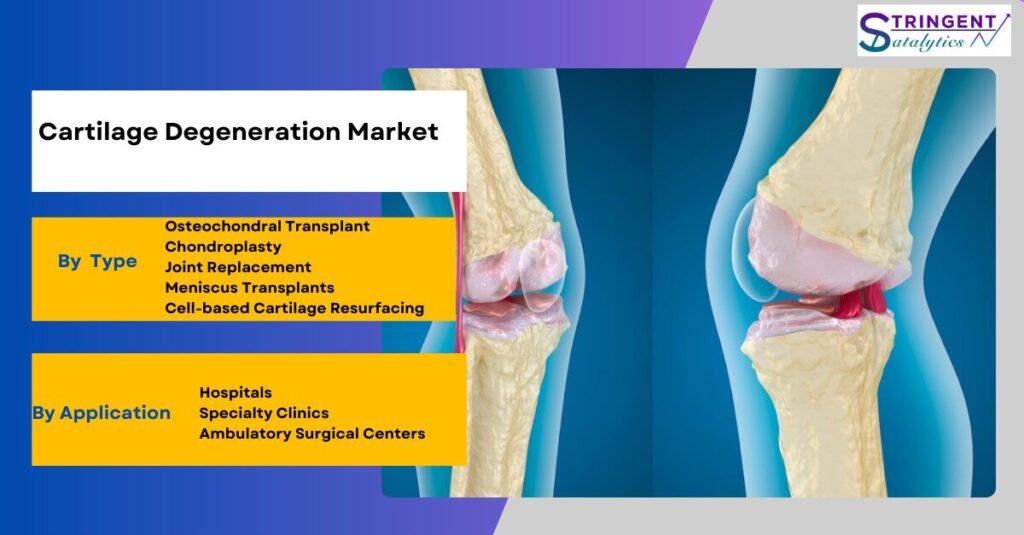The market for cartilage degeneration encompasses a variety of therapeutic modalities aimed at managing symptoms, slowing disease progression, and restoring joint function. Key components of the market include:
- Pharmaceutical Interventions: Pharmacological treatments for cartilage degeneration often focus on pain management and inflammation reduction. Nonsteroidal anti-inflammatory drugs (NSAIDs), analgesics, corticosteroid injections, and hyaluronic acid injections are commonly used to alleviate symptoms and improve joint function.
- Biologic Therapies: Biologic therapies aim to target underlying disease processes and promote cartilage repair and regeneration. Platelet-rich plasma (PRP) therapy, mesenchymal stem cell (MSC) therapy, and growth factor injections are among the emerging biologic treatments showing promise in stimulating tissue healing and restoring joint health.
- Regenerative Medicine: Regenerative medicine approaches seek to harness the body’s natural healing mechanisms to repair damaged cartilage and restore joint function. Techniques such as autologous chondrocyte implantation (ACI), matrix-induced autologous chondrocyte implantation (MACI), and tissue engineering-based scaffolds offer potential solutions for cartilage repair and regeneration.
- Orthopedic Devices: Orthopedic devices play a critical role in supporting joint function and relieving mechanical stress on damaged cartilage. These devices include braces, orthoses, and joint unloading devices designed to stabilize the joint, redistribute forces, and reduce pain during weight-bearing activities.
- Surgical Interventions: In cases of severe cartilage degeneration or joint damage, surgical interventions such as arthroscopic debridement, microfracture, mosaicplasty, and total joint replacement may be necessary to restore joint function and alleviate symptoms.
The cartilage degeneration market is characterized by ongoing research and development efforts aimed at advancing treatment modalities and improving patient outcomes. Key areas of focus include the development of disease-modifying drugs, the optimization of tissue engineering techniques for cartilage repair, and the integration of digital health technologies for personalized treatment approaches.
Challenges in the cartilage degeneration market include the limited capacity of current treatments to halt disease progression or achieve long-term cartilage regeneration, as well as the high cost and invasiveness of certain surgical interventions. Addressing these challenges requires interdisciplinary collaboration among researchers, clinicians, industry stakeholders, and regulatory agencies to develop innovative therapies, enhance treatment efficacy, and optimize patient care pathways for individuals with cartilage degeneration disorders.
Get Free Exclusive PDF Sample Copy of This Research Report https://stringentdatalytics.com/sample-request/cartilage-degeneration-market/16338/
Market Segmentations:
Global Cartilage Degeneration Market: By Company
DePuy Synthes
Zimmer Biomet
Stryker
Smith & Nephew
- Braun
CartiHeal
Vericel
Depuy Synthes
Anika Therapeutics
Conmed
Arthrex
Global Cartilage Degeneration Market: By Type
Osteochondral Transplant
Chondroplasty
Joint Replacement
Meniscus Transplants
Cell-based Cartilage Resurfacing
Others
Global Cartilage Degeneration Market: By Application
Hospitals
Specialty Clinics
Ambulatory Surgical Centers
Global Cartilage Degeneration Market: Regional Analysis
The regional analysis of the global Cartilage Degeneration market provides insights into the market’s performance across different regions of the world. The analysis is based on recent and future trends and includes market forecast for the prediction period. The countries covered in the regional analysis of the Cartilage Degeneration market report are as follows:
North America: The North America region includes the U.S., Canada, and Mexico. The U.S. is the largest market for Cold-chain Pharma in this region, followed by Canada and Mexico. The market growth in this region is primarily driven by the presence of key market players and the increasing demand for the product.
Europe: The Europe region includes Germany, France, U.K., Russia, Italy, Spain, Turkey, Netherlands, Switzerland, Belgium, and Rest of Europe. Germany is the largest market for Cold-chain Pharma in this region, followed by the U.K. and France. The market growth in this region is driven by the increasing demand for the product in the automotive and aerospace sectors.
Asia-Pacific: The Asia-Pacific region includes Singapore, Malaysia, Australia, Thailand, Indonesia, Philippines, China, Japan, India, South Korea, and Rest of Asia-Pacific. China is the largest market for Cold-chain Pharma in this region, followed by Japan and India. The market growth in this region is driven by the increasing adoption of the product in various end-use industries, such as automotive, aerospace, and construction.
Middle East and Africa: The Middle East and Africa region includes Saudi Arabia, U.A.E, South Africa, Egypt, Israel, and Rest of Middle East and Africa. The market growth in this region is driven by the increasing demand for the product in the aerospace and defense sectors.
South America: The South America region includes Argentina, Brazil, and Rest of South America. Brazil is the largest market for Cold-chain Pharma in this region, followed by Argentina. The market growth in this region is primarily driven by the increasing demand for the product in the automotive sector.
Click Here, To Buy Premium Report https://stringentdatalytics.com/purchase/cartilage-degeneration-market/16338/?license=single
About Stringent Datalytics
Stringent Datalytics offers both custom and syndicated market research reports. Custom market research reports are tailored to a specific client’s needs and requirements. These reports provide unique insights into a particular industry or market segment and can help businesses make informed decisions about their strategies and operations.
Syndicated market research reports, on the other hand, are pre-existing reports that are available for purchase by multiple clients. These reports are often produced on a regular basis, such as annually or quarterly, and cover a broad range of industries and market segments. Syndicated reports provide clients with insights into industry trends, market sizes, and competitive landscapes. By offering both custom and syndicated reports, Stringent Datalytics can provide clients with a range of market research solutions that can be customized to their specific needs.
Contact Us
Stringent Datalytics
Contact No- +1 346 666 6655
Email Id- sales@stringentdatalytics.com
Web- https://stringentdatalytics.com/

